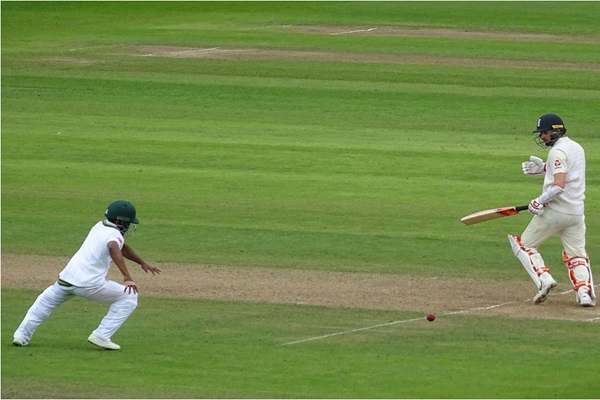.png)
Offscript Weekly: Dignity In The Ashes, Hope On One Leg
Amid wreckage and war cries, hope moved. One leg at a time. This week, dignity rose quietly while power made noise.


Ranjana Chauhan is a senior financial journalist. She brings sharp focus on the softer aspects of business and enjoys writing on diverse themes, from the gender lens to travel and sports.
June 17, 2025 at 7:16 AM IST
His grandmother named him Temba, the Zulu word for hope. Not power. Not glory. Just hope. A quiet promise in a loud world.
And this week, that promise limped into Lord’s. One human leg bandaged, one entire nation holding its breath.
Temba Bavuma, too small, too silent, too often written off, led South Africa to their first-ever World Test Championship title. The critics had dismissed him. Now he was dismissing doubt.
“Giving up is always an option,” he said after the match against Australia. “It’s always there at the back of your mind. But something kind of holds you on.”
That something was hope. Hope that outlasts injury. Hope that endures insult. Hope that does not demand applause from others, only personal commitment to persistence.
Ten Tests into his captaincy, Bavuma now holds the best win record among modern Test leaders; better than Waugh, better than Dhoni. And when he lifted the mace at the Lord’s, he didn’t just hold a trophy. He held space for every quiet fighter who’s ever been told they weren’t enough.
“For me, it was that moment there: to be recognised as more than just a Black African cricketer, but as someone who’s done something the country has wanted.”
In a world cracking under noise, rage, and spectacle, sticking with hope might just be the most radical act left.
But as the world watched Bavuma rise, tragedy had struck closer to home.
India was left reeling after an Air India Dreamliner crashed in Ahmedabad, a flight that barely lifted off before slamming into a medical college hostel. Onboard were passengers bound for London. On the ground were students who had just sat down for lunch.
No warning. No time. Just metal tearing through concrete; and silence giving way to fire.
Now, many are second-guessing air travel. But what about those who weren’t flying? What about students grabbing a meal between lectures? Where do you draw the line between fear and fate, between risk and pure randomness?
There was shock, and then a wave of grief. Both deeply personal and achingly public. Tragedy now enters our homes uninvited, settling into our feeds, demanding space in our head.
And almost as quickly, grief gave way to the spotlight. The mourning was repackaged for primetime. News anchors slipped into crisis mode, narrating tragedy with the same breathless theatrics they’d used just days earlier for the “Honeymoon Murder in Meghalaya.” Every frame got stylised for drama. Every headline posed a question it never meant to leave unanswered.
Yes, we need answers. But not from TikTok crash ‘experts’ or influencers chasing the algorithm. They come from black boxes, real investigations and regulators, not trending soundtracks.
Not everything has to become a content strategy. Some stories deserve the dignity of silence. And a pause for introspection.
Elsewhere, the fires of conflict flared as the Israel-Iran conflict blew open again.
Israel launched a wave of strikes across Iran on Friday, hitting military and nuclear-linked targets, and killing key officials reportedly tied to Tehran’s drone and missile programmes. Israel claimed right to “targeted attack” to prevent Iran’s claim of “peaceful nuclear program” crossing over to weapons. Iran’s retaliation came immediately with missile firing, which Israel branded as indiscriminate. The choreography of escalation is back, and this time, the stakes feel uncomfortably high.
We witnessed raw action on our feed as Israel struck Iran’s state broadcaster mid-transmission, sending anchors scrambling off-air. Not just an attack on infrastructure, but on voice, perception, control. A strike on the signal itself.
And yet, in the middle of flying missiles and hardening rhetoric, there’s also a faint signal of diplomacy. Backchannel talks have reportedly resumed. No use of the word "ceasefire" yet, but there’s enough anxiety around to take that call. Experts are trying to understand the ways of American powerplay under President Trump.
And across the Atlantic, we are witnessing the highest-level meetings and sharpest diplomacy tactics at play in Canada. Hosting the G7 summit is indeed a “high-wire act” for Mark Carney. Leaders posed for unity, but the fractures were audible. Trump refused to sign the joint statement on Iran and left early, citing “scheduling conflicts.” The rest smiled for the cameras, but the choreography was strained.
While on Trump, apart from cake and good cheer, his 79th birthday celebrations had tanks, jets, and a military parade that looked more like a one-man regime reboot than a tribute to democracy. The crowds? Not as big as the birthday boy would’ve liked. But across cities, from New York to LA, tens of thousands of protesters marched under the banner “No Kings,” waving cardboard crowns and quoting the Founding Fathers. Some placards read: “No crown for the clown.” You can stage a spectacle, but democracy doesn’t clap for coronations. At least not as yet.
In Europe, resistance took a lighter, if wetter, form. Locals in Palma and Barcelona took to squirting tourists with water guns, a protest against overtourism. “My city is not your theme park,” read one placard, a sentiment that also echoed in Venice, Florence, and parts of southern France, where residents are pushing back against life lived in selfie mode. Tourism versus livability. The backlash is just getting started.
Meanwhile, the weather isn’t waiting for debate. India is moving toward mandating higher default AC temperatures to curb power stress. And in Arizona and Nevada, officials are advising people to skip their morning coffee during heatwaves, citing cardiac risk.
When climate change comes for caffeine, maybe we’ll finally wake up.
Still, through the noise, something quieter held its ground. Temba didn’t lead a revolution. He didn’t change the world. But he carried a nation and limped into history.
This week, hope moved slowly. But move it did.



